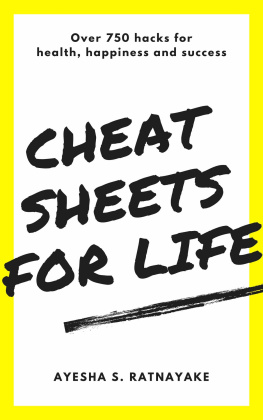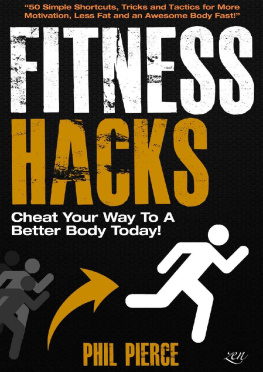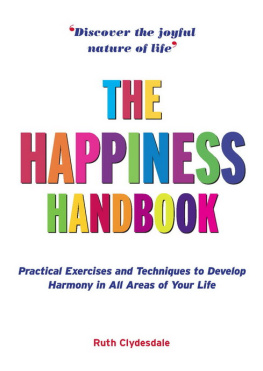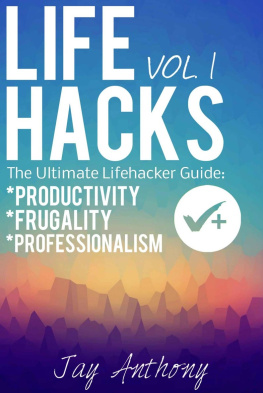CHEAT SHEETS FOR LIFE
Over 750 hacks for
health, happiness and success
Ayesha S. Ratnayake
Copyright 2021 Ayesha S. Ratnayake
All rights reserved. No part of this publication may be reproduced, distributed, or transmitted in any form or by any means, including photocopying, recording, or any other electronic or mechanical methods, without the prior written permission of the publisher, except in the case of brief quotations embodied in critical reviews and certain other non-commercial uses permitted by copyright law.
For permission requests, write to the publisher at hi@cheatsheets.life
A portion of this book includes research findings on diet and exercise. It is supplied for informational purposes only and is not meant to take the place of a doctors advice. Before embarking on any regimen of diet and exercise you should first consult your own physician.
www.cheatsheets.life
For my father, who influenced me to value science.
For my mother, who inspired me to practice kindness.
Contents
Why I Wrote This Book
When I was a child, my father encouraged me to read non-fiction. So, in addition to my towers of fiction, I started reading books on science, philosophy, and self-help. And I discovered, between their pages, useful insights that could help me make my life better. As I grew older, I came to love non-fiction even more than fiction, and I started reading deeply about happiness, productivity, and success. I turned my lengthy morning and evening commutes into library visits, listening to audiobooks on my pet subjects, eventually completing over 70 books in a year.
I started jotting down notes from my readings, categorising them according to the area of my life they would benefit. I discovered that, across nearly every dimension of my life, I didnt need to reinvent the wheel. Someone, somewhere, had experienced the same problems and performed scientific studies to identify which actions produced the best outcomes the majority of the time. In effect, it was possible to derive a handbook for life, based on the efforts of hundreds of researchers.
So thats exactly what I did. After decades spent combing through, saving, bookmarking, and taking notes from research, articles, Yale courses, and hundreds of books, I built the book Ive been seeking all my life a concise handbook of science-backed advice on 17 dimensions of life from health to money to parenting.
My hope is that, rather than making it up as you go along, you too can benefit from the knowledge Ive derived from decades of research. Armed with these insights, I hope you will craft for yourself a life that brings you incredible health, happiness, and success.
How To Use This Book
In a moment, youre going to be exposed to a wealth of information on the tactics that research shows can point you towards health, happiness and success. You may feel excited to start implementing all these ideas at once. For the perfectionists out there (you know who you are!), I want to assure you that you dont need to act on every single item in order to see big improvements in your life. Even I, as the author, dont practice every one of these strategies!
Instead, I would encourage you to pick out a few ideas that most resonate with you from every chapter, and strive to build these into your life. In some cases, just knowing the best practices will be enough to help you make great decisions that benefit your life. In other cases, you may need to change your habits.
Where a change in habits is needed, remember to start small. Instead of taking on several new habits at once, list them out in order of priority, and then practice the first one until it is a regular part of your routine, before starting on the next. See the chapter on Motivation for some great pointers on the science of habit formation. You can also download the Cheat Sheets for Life Habit Planner resource by typing cheatsheets.life/#resources into your web browser, or simply by clicking here .
Make this book work for you. Read it in order or skip around to the chapters you think would most benefit you. Treat it as a guide you can pick up anytime you want to perform better in any dimension of life.
Finally, I encourage you to explore the Bibliography at the end of the book to read further on any suggestion that is of special interest to you.
1 Everyday happiness
Of this be sure: You do not find the happy life... You make it.
Thomas S. Monson
We all want to be happier. Luckily, while 50% of our happiness does derive from our genetic setpoint, and 10% from our life circumstances, a whopping 40% is determined by our own actions, thoughts, and intentions its in our control. Try these practices to build more joy into your life.
Cooking up instant happiness
Smile Smiling tricks your brain into thinking you must be happy, as much as 2,000 bars of chocolate or receiving 20,000 dollars in cash! Even a fake smile counts. For an even bigger boost, try laughing.
Walk happy The way you walk affects your mood. Avoid slouching and walking slowly. Instead, take longer strides, hold your head high, and swing your arms.
Make music work Songs with 60-80 beats per minute (but no lyrics) can reduce stress. Find a playlist on YouTube. Actively try to feel happier when listening to upbeat music it works.
Get out in nature Reap the benefits of going green. Just 20 minutes in nature lowers stress hormones. Even a house plant or looking at photos of natural scenes helps you recover from stress.
Savour this moment Appreciation is a more powerful predictor of life satisfaction than personality, gratitude, gender, age, or ethnicity. For best results, use all your senses when you savour the moment.
Consider the worst Right now, consider all the minor choices and occurrences that had to happen to make the most fulfilling parts of your life possible. Then, imagine your life if they had never happened.
Take photos Did you know that taking photos can actually help you enjoy an experience more? Go on get clicking!
Focus Youre less happy when your mind wanders than when youre focused on what youre doing. Avoid multitasking and get absorbed.
Rediscover the past Reminiscing (even about normal, everyday experiences) can generate a surprising amount of happiness.
Plan a trip Planning a trip can make you feel great, even if you dont take it. Design for yourself the perfect day with everything you most enjoy then go live it!
Adopting happiness habits
Practice gratitude In a study of character strengths, gratitude was found to be the single best predictor of wellbeing. Start keeping a gratitude journal today to build the gratitude habit.
Bask in the sunlight Exposure to sunlight accounts for over 90% of most individuals vitamin D requirements. Why does that matter? Because Vitamin D naturally boosts mood and helps prevent depression.
Exercise Just 20 minutes of exercise can boost your happiness for 12 hours. Meanwhile, exercising in nature can improve mental health in just 5 minutes. And group exercise for 45 mins 3-5 times a week helps mental health most. Also, exercise with motivating music it will improve your mood by 15%.
Take up yoga or tai chi Yoga boosts mood, reduces stress, and improves brain function, and tai chi has similar benefits in reducing mental and emotional stress.
Master mindfulness Mindfulness meditation can reduce levels of everyday stress, with longer-lasting effects than a vacation.
Avoid social media For most people, using social media reduces happiness and lowers self-esteem. In fact, cutting out social media can have a greater impact on your wellbeing than increased income.






